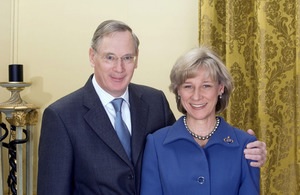British royal family
(Redirected from British Royal Family)
Family consisting of close relatives of the monarch of the United Kingdom
The British royal family comprises the close relatives of the monarch of the United Kingdom. The family members support the monarch in their state and national duties. Each member has their own distinct public role and often participates in various ceremonial, charitable, and representational activities.
History[edit | edit source]
The current British royal family is part of the House of Windsor, which was established by George V in 1917. The name was changed from the House of Saxe-Coburg and Gotha due to anti-German sentiment during World War I.
Members[edit | edit source]
The main members of the British royal family include:
- Charles III, the current monarch
- Camilla, Queen Consort
- William, Prince of Wales
- Catherine, Princess of Wales
- Prince George of Wales
- Princess Charlotte of Wales
- Prince Louis of Wales
- Prince Harry, Duke of Sussex
- Meghan, Duchess of Sussex
- Prince Andrew, Duke of York
- Princess Beatrice
- Princess Eugenie
Roles and Duties[edit | edit source]
Members of the British royal family undertake various official, ceremonial, diplomatic, and representational duties. They often represent the UK abroad and support the monarch in their state functions. Many members are also involved in charitable work and patronage of various organizations.
Residences[edit | edit source]
The British royal family resides in several official residences, including:
Titles and Styles[edit | edit source]
Members of the British royal family hold various titles and styles, often reflecting their rank and role within the family. Common titles include Prince, Princess, Duke, and Duchess.
Public Perception and Media[edit | edit source]
The British royal family is a subject of significant public interest and media coverage. Their activities, personal lives, and public appearances are frequently reported in the press and scrutinized by the public.
Related Pages[edit | edit source]
- Monarchy of the United Kingdom
- House of Windsor
- List of British monarchs
- Line of succession to the British throne
- Commonwealth realms
- Royal coat of arms of the United Kingdom
- Crown Estate
See Also[edit | edit source]
Categories[edit | edit source]
This article is a British royalty stub. You can help WikiMD by expanding it!
Search WikiMD
Ad.Tired of being Overweight? Try W8MD's physician weight loss program.
Semaglutide (Ozempic / Wegovy and Tirzepatide (Mounjaro / Zepbound) available.
Advertise on WikiMD
|
WikiMD's Wellness Encyclopedia |
| Let Food Be Thy Medicine Medicine Thy Food - Hippocrates |
Translate this page: - East Asian
中文,
日本,
한국어,
South Asian
हिन्दी,
தமிழ்,
తెలుగు,
Urdu,
ಕನ್ನಡ,
Southeast Asian
Indonesian,
Vietnamese,
Thai,
မြန်မာဘာသာ,
বাংলা
European
español,
Deutsch,
français,
Greek,
português do Brasil,
polski,
română,
русский,
Nederlands,
norsk,
svenska,
suomi,
Italian
Middle Eastern & African
عربى,
Turkish,
Persian,
Hebrew,
Afrikaans,
isiZulu,
Kiswahili,
Other
Bulgarian,
Hungarian,
Czech,
Swedish,
മലയാളം,
मराठी,
ਪੰਜਾਬੀ,
ગુજરાતી,
Portuguese,
Ukrainian
Medical Disclaimer: WikiMD is not a substitute for professional medical advice. The information on WikiMD is provided as an information resource only, may be incorrect, outdated or misleading, and is not to be used or relied on for any diagnostic or treatment purposes. Please consult your health care provider before making any healthcare decisions or for guidance about a specific medical condition. WikiMD expressly disclaims responsibility, and shall have no liability, for any damages, loss, injury, or liability whatsoever suffered as a result of your reliance on the information contained in this site. By visiting this site you agree to the foregoing terms and conditions, which may from time to time be changed or supplemented by WikiMD. If you do not agree to the foregoing terms and conditions, you should not enter or use this site. See full disclaimer.
Credits:Most images are courtesy of Wikimedia commons, and templates, categories Wikipedia, licensed under CC BY SA or similar.
Contributors: Prab R. Tumpati, MD







